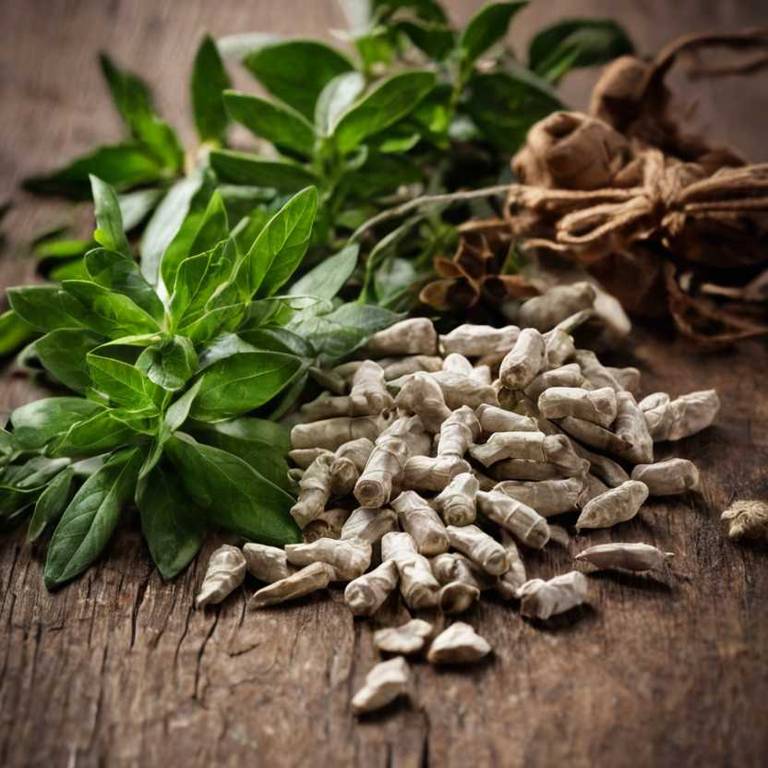10 Best Styrax Benzoin Preparations

The best medicinal preparations of Styrax benzoin are teas, decoctions, tinctures, creams, and syrups, each offering unique benefits for various health conditions.
Teas made from the resin are commonly used to soothe respiratory issues and reduce inflammation.
Decoctions involve simmering the bark or resin to extract its medicinal properties, often used for digestive support.
Tinctures provide a concentrated form of the herb, useful for treating wounds and infections.
Creams and syrups are applied topically or ingested to address skin irritations and coughs, respectively.
Below there's a list of the 10 best herbal preparations of styrax benzoin for medicinal purposes.
1. Teas
Styrax benzoin teas is commonly used to treat respiratory tract infections, skin conditions, and as an antiseptic.
The most common medicinal uses include alleviating symptoms of coughs, bronchitis, and sore throat, as well as promoting wound healing and reducing inflammation. It is also used in traditional medicine to address digestive issues and support immune function. The bioactive constituents responsible for its medicinal properties include tannins, essential oils, resins, and flavonoids, which exhibit antimicrobial, anti-inflammatory, and astringent effects.
These compounds contribute to its ability to combat infections and soothe irritated tissues.

2. Decoctions
Styrax benzoin decoctions is commonly used to treat respiratory and skin conditions due to their anti-inflammatory and antiseptic properties.
These decoctions are traditionally employed to alleviate symptoms of coughs, bronchitis, and throat infections, as well as to manage wounds and skin irritations. The most common medicinal uses include treating respiratory tract infections, inflammatory skin disorders, and as an expectorant to loosen mucus. The bioactive constituents responsible for these effects include essential oils, tannins, and resinous compounds such as benzoic acid and styrax.
These components contribute to the plant's antimicrobial, astringent, and soothing properties.

3. Tinctures
Styrax benzoin tinctures is commonly used to treat respiratory infections, skin wounds, and inflammatory conditions due to their antimicrobial and anti-inflammatory properties.
They are often applied topically for their ability to promote healing and reduce swelling. The tinctures are also used in traditional medicine to alleviate symptoms of colds and coughs. The bioactive constituents responsible for these effects include benzoic acid, styrinic acid, and various essential oils that possess antimicrobial, astringent, and analgesic properties.
These compounds work synergistically to provide the medicinal benefits associated with Styrax benzoin tinctures.

4. Creams
Styrax benzoin creams is commonly used to treat skin conditions such as eczema, psoriasis, and minor wounds due to their anti-inflammatory and antimicrobial properties.
These creams are also applied to reduce pain and inflammation associated with arthritis and other inflammatory disorders. The most common medicinal uses include soothing irritations, promoting skin healing, and preventing infections in minor cuts and abrasions. The bioactive constituents responsible for these effects include benzoic acid, styrinic acid, and various essential oils that have antiseptic, astringent, and anti-inflammatory actions.
These compounds work together to provide the therapeutic benefits observed in traditional and modern applications of Styrax benzoin.

5. Syrups
Styrax benzoin syrups is commonly used to treat respiratory conditions such as coughs, bronchitis, and sore throats due to its expectorant and antimicrobial properties.
The preparation is also used for its soothing effects on the mucous membranes, making it beneficial for ailments like laryngitis and upper respiratory infections. Common medicinal uses include alleviating symptoms of colds, reducing inflammation, and promoting healing of minor wounds. The bioactive constituents responsible for these effects include benzoic acid, tannins, and volatile oils, which exhibit antimicrobial, astringent, and anti-inflammatory actions.
These properties make Styrax benzoin syrups a traditional remedy in various herbal medicine systems.

6. Mucillages
Styrax benzoin mucillages is commonly used to treat respiratory and skin conditions due to its soothing and protective properties.
It is often employed for alleviating symptoms of coughs, sore throats, and inflammation in the respiratory tract. Additionally, it is applied topically to wounds, ulcers, and inflamed skin to promote healing and reduce irritation. The medicinal effects are attributed to bioactive constituents such as tannins, mucilage polysaccharides, and essential oils, which exhibit anti-inflammatory, antimicrobial, and wound-healing properties.
These components work synergistically to support the body's natural healing processes and provide relief from various ailments.

7. Capsules
Styrax benzoin capsules is commonly used to treat respiratory tract infections, skin conditions, and inflammatory disorders.
They are often employed for their antimicrobial, anti-inflammatory, and wound-healing properties. The most common medicinal uses include alleviating symptoms of coughs, colds, bronchitis, and eczema. They are also used in traditional medicine to support digestive health and reduce inflammation.
The bioactive constituents responsible for these effects include benzoic acid, styracin, and other volatile oils that exhibit antimicrobial and anti-inflammatory activities.

8. Lozenges
Styrax benzoin lozenges is commonly used to relieve symptoms of respiratory tract infections, such as sore throat, cough, and bronchitis.
They are also used to soothe irritation in the mouth and throat, making them popular for treating conditions like pharyngitis and laryngitis. The lozenges are often employed in traditional medicine for their antimicrobial and anti-inflammatory properties. The bioactive constituents include essential oils, resins, tannins, and flavonoids, which contribute to their therapeutic effects.
These compounds help reduce inflammation, fight bacterial infections, and promote healing of mucous membranes.

10. Oils
Styrax benzoin oils is commonly used to treat respiratory infections, skin conditions, and as an antiseptic.
It is often applied topically for its soothing effects on wounds, eczema, and fungal infections. The oil is also used in aromatherapy to relieve congestion and support immune function. The most common medicinal uses include alleviating symptoms of colds, bronchitis, and sore throats, as well as promoting skin healing.
The bioactive constituents responsible for its medicinal properties include benzoic acid, styrax, and essential oils, which exhibit antimicrobial, anti-inflammatory, and astringent effects.
